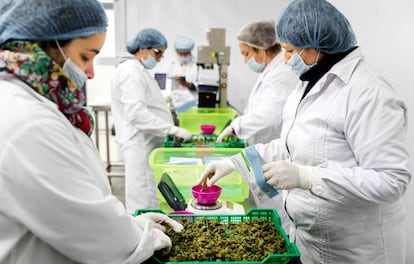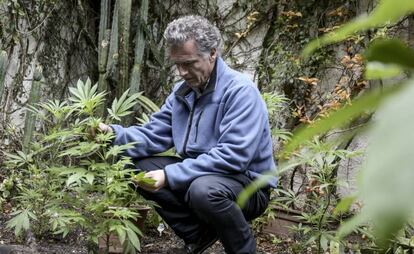Uruguay loses momentum in the marijuana legalization stakes
Decision to make recreational use legal has been dogged by unexpected difficulties such as a bank veto


Uruguay was a pioneer in legalizing marijuana. In July 2017, the Ministry of Public Health started selling small five-gram bags for €5.25, making it the first country in the world to back the open distribution and sale of recreational marijuana.
There has been no increase in addiction or other adverse side effects. Consumers are happy and public opinion is increasingly in favor of the move. But there is a paradoxical phenomenon occurring – the black market continues to peddle the drug while the spin-off industry has failed to take off.
The black market continues to peddle the drug while the spin-off industry has failed to take off
Offering his opinion on the quality of a bag of marijuana purchased from a pharmacy, a young man enjoying a morning smoke on the Rambla Francia, by Montevideo’s waterfront, says, “It’s good; weak but good.” To buy the bag, he had to stand in line – not because there is an avalanche of demand but because only 17 of the 1,000 pharmacies in Uruguay sell it due to pressure from the banks.
“We believed in our sovereignty and we didn’t take this factor into account,” admits Augusto Vitale, a psychologist and former president of the Institute for the Regulation and Control of Cannabis, who was instrumental in its legalization. “We did not take into account the US Terrorist Act or UN regulations.”
The fact is that the banks refuse to work with anybody connected to the sale of marijuana for fear of international sanctions, and this has had a knock-on effect on the pharmacies and the growers, as well as on the firms that want to market by-products such as medicines, cosmetics, food and hemp.
Curiously, now that marijuana is legal, it is necessary to create networks of companies to provide a smokescreen to hide the real business, at least to deal with the banks. “The imminent legalization in a country as big as Canada [in effect from October 17] will perhaps relax this global prohibitionist attitude and alleviate these problems,” says Vitale.

But it is not just the financial sector that is throwing up obstacles. There are also political fences to jump. The current president of Uruguay, Tabaré Vázquez, who is a doctor by trade, considers marijuana to be dangerous. The same goes for the Ministry of Public Health. While the legalization of cannabis was a priority for the country’s former president, the charismatic Pepe Mújica, now it seems the government prefers to sweep the matter under the carpet. A spokesman for the president declined to comment for this story.
So even though the sale of cannabis is still regulated for recreational use, the development of the industry is frozen due to the lack of a legal framework. Medicinal use, which is the real source of income for the private sector and the public coffers, is at a standstill.
“We started ahead of the game, but if we don’t get a move on in the next two years, we will lose out against companies from Canada, Zimbabwe, Lesotho, Portugal, Colombia and perhaps Mexico,” says Eduardo Blasina, a respected businessman and expert in agricultural matters.
Blasina was a shareholder in Symbiosis, one of the companies that received a state license to cultivate marijuana. But he no longer is. His business group does, however, still invest in cannabis products although he says that it seems easier to sell them anywhere in Germany than in Montevideo.
We’re talking about legal marijuana being distributed illegally
Sebastián Aguiar, sociologist
Even Chile, a pro-prohibition country, is ahead of Uruguay when it comes to cannabis for medicinal use. The red tape surrounding the approval of a product in Uruguay means it has to undergo the standard medicinal tests, which can take up to 10 years to complete. In other countries, the approval of oils and ointments from marijuana such as cannabidiol, which relieves chronic pain and is used in conjunction with oncology treatments, require less rigorous testing. This rigorous testing can be explained by the fact that Uruguay’s Ministry of Public Health shares responsibility with the manufacturer for any damaging side effect produced by a medicine.
“There are a lot of complaints and it seems we are forgetting the essential – that legalization works and that things are moving forward,” says Juan Baz, one of the activists who helped persuade Pepe Mújica – “and above all his wife Lucía,” – to champion legalization. Now he is the voice of reason. Regarding the strength of the marijuana sold in pharmacies, he explains, “Of course. No one wants a youngster with no experience to buy a bag in a pharmacy and end up unconscious. We veterans use weed with a THC [the principal psychoactive component] above 12% and you get that from growing your own or in [marijuana] clubs.”
Now an entrepreneur, Baz has a research partnership with the Pasteur Institute in Paris. He is also involved in the development of the cannabis industry in the country’s interior regions.
The clubs admit up to 45 members and sell up to 480 grams a year to each one. But, like the pharmacies, they can’t sell to foreigners. And Uruguay is a big tourist destination. Foreign demand is one of the reasons that the black market continues to exist, though it is no longer associated with violence and traffickers. Little more than a third of Uruguayan consumers are registered with pharmacies or clubs. The rest remain in the twilight zone.
“We’re talking about legal marijuana being distributed illegally,” says Sebastián Aguiar, a sociologist at the Social Sciences School of Universidad de la República in Montevideo. Aguiar, who has been monitoring the effects of legalization, points out that the adulterated cannabis from Paraguay that was consumed previously has disappeared from the market.
He says that in 2017, for the first time, the majority of the population backed the lawful sale of marijuana with 44% in favor, 42% against and 90% supporting its medicinal use. And he is skeptical of surveys that claim consumption has risen. Perhaps, he says, what increases with legalization is the level of truthfulness by the respondents.
English version by Heather Galloway.
Tu suscripción se está usando en otro dispositivo
¿Quieres añadir otro usuario a tu suscripción?
Si continúas leyendo en este dispositivo, no se podrá leer en el otro.
FlechaTu suscripción se está usando en otro dispositivo y solo puedes acceder a EL PAÍS desde un dispositivo a la vez.
Si quieres compartir tu cuenta, cambia tu suscripción a la modalidad Premium, así podrás añadir otro usuario. Cada uno accederá con su propia cuenta de email, lo que os permitirá personalizar vuestra experiencia en EL PAÍS.
¿Tienes una suscripción de empresa? Accede aquí para contratar más cuentas.
En el caso de no saber quién está usando tu cuenta, te recomendamos cambiar tu contraseña aquí.
Si decides continuar compartiendo tu cuenta, este mensaje se mostrará en tu dispositivo y en el de la otra persona que está usando tu cuenta de forma indefinida, afectando a tu experiencia de lectura. Puedes consultar aquí los términos y condiciones de la suscripción digital.








































